This blog challenge is to stimulate my own genealogy blogging efforts in 2014 by focussing on a different kind of genealogical record each week. I wanted a challenge that reflected my own archival background as well as my own genealogy interests and there are probably lots of other records that I could have included. The challenge has an Australian focus but most of these records will be found just about anywhere in the genealogy world.
The 52 different types of genealogical records I finally decided on are listed in no particular order (each week will be a random surprise). Originally I planned to do this over 52 weeks but I now realise that I have to factor in travel and illness so it will continue a little bit over a year. Anyone is welcome to do all or part of this blogging challenge. Let me know if you are participating and I will put a link to your post under each week’s challenge.
So far I know of six bloggers who are taking up the challenge from time to time and I have put links to their individual entries at the end of each week’s blog if they have submitted something for that week. Thanks Judy Webster, Sharn White, Cassmob, Anne, Campaspe Library and Sharon for participating and encouraging me to keep up the blog challenge myself!
Also participating in this blog challenge:
Links to Week 1 Military Medals Week 2 Internal Migration Week 3 Probates (wills and administrations) Week 4 Memorial Cards Week 5 Family Stories Week 6 Land Records Week 7 Local Histories Week 8 Diaries Week 9 Inquest Records Week 10 Occupation Records Week 11 Newspapers Week 12 Gazetteers Week 13 Personal Names and Surnames Week 14 Cemetery Records Week 15 Civil Registration and Certificates Week 16 Naturalization and Citizenship Records Week 17 Court Records
Week 18 Almanacs
I love looking at almanacs as they are similar to directories and newspapers with lots of different information, lists of names and interesting advertisements. Once upon a time we might have used print copies if they were not too fragile or more likely it would have been microfiche or microfilm. This made them less easy to use (in my opinion) but now we have many almanacs digitised by Archive Digital Books Australasia for sale or in libraries, some are available through findmypast.com.au and some are even online for free.
Quite a lot of my research is in Queensland and I regularly use Text Queensland where you can get a range of digitised historical books and journals on Queensland, government gazettes to 1900, The Queenslander and Pugh’s Almanac all online for free. As this week’s topic is almanacs I will confine my blog challenge to Pugh’s.
The exact title varied over the years but most people simply use the generic title Pugh’s Almanacs. The range online is from 1859 to 1927 which is fantastic and you can search or select a particular year. The table of contents reveals how informative these annual publications can be. There are lists of people under all types of subjects including occupations, government departments, community organisations and clubs and country directories. The Ministers of Religion section is also useful as it tells you where various churches and denominations were at a particular time. An annual calendar of events, statistics on just about everything and Men of the Time in Queensland that year are also features that I like to follow up.
The 186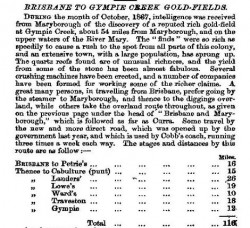 9 Pugh’s Almanac has a description of the Brisbane to Gympie goldfields route in the Country Directory section. As quite a few of my families went to the Gympie goldfields it is interesting to read how they actually travelled there. It not only gives the direct Cobb and Co route but also other routes depending on where someone was starting out from. This is a great section to look at because it outlines how people travelled around Queensland in 1869.
9 Pugh’s Almanac has a description of the Brisbane to Gympie goldfields route in the Country Directory section. As quite a few of my families went to the Gympie goldfields it is interesting to read how they actually travelled there. It not only gives the direct Cobb and Co route but also other routes depending on where someone was starting out from. This is a great section to look at because it outlines how people travelled around Queensland in 1869.
I have also found quite a few advertisements for various family businesses and even the death of my great great grandfather was listed in the calendar of events. In the 1898 Pugh’s Almanac calendar of events for 4 June it simply states ‘a woodcutter named Gunderson was killed at Coorparoo’. Although not much information it does show that all kinds of events were put into the calendar not just major or significant events.
The eas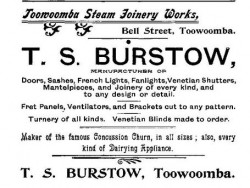 iest way to see what almanacs have been digitised (and therefore more easily accessible and searchable) is to check the catalogue at Gould Genealogy & History for the heading Archive Digital Books. This section is then divided up into national, state and territory and then subdivided up into subject categories including directories and almanacs. Once you have a title you can then search on Trove to see if it is held in a library near you or online. Your local genealogy or family history society may have copies too.
iest way to see what almanacs have been digitised (and therefore more easily accessible and searchable) is to check the catalogue at Gould Genealogy & History for the heading Archive Digital Books. This section is then divided up into national, state and territory and then subdivided up into subject categories including directories and almanacs. Once you have a title you can then search on Trove to see if it is held in a library near you or online. Your local genealogy or family history society may have copies too.
Like newspapers you can spend a lot of time looking through almanacs for direct references to your ancestors and background context to help you understand the local communities is which they lived. If you really want to know more about your ancestors lives in detail then almanacs will definitely help you to do that. Why not have a look?

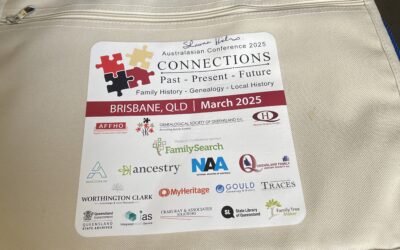
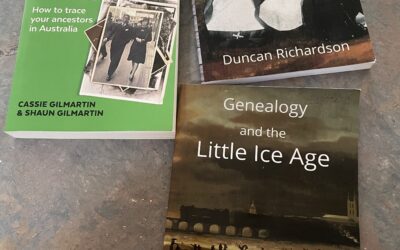
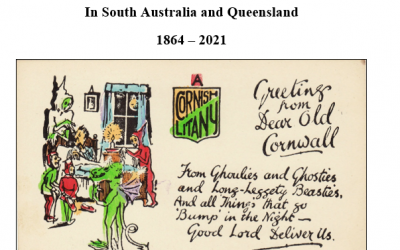

0 Comments